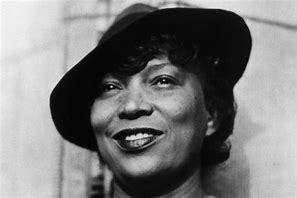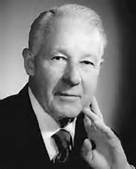“Sometimes, I feel discriminated against, but it does not make me angry. It merely astonishes me. How can any deny themselves the pleasure of my company? It is beyond me” — Harlem Renaissance author Zora Neale Hurston in How It Feels to be Colored Me (1928).
Read MoreWatts on Character
“Character does count. For too long we have gotten by in a society that says the only thing right is to get by and the only thing wrong is to get caught. Character is doing what's right when nobody is looking” — former college and professional football player and U.S. Congressman J. C. Watts at the 1996 GOP National Convention.
Read MoreChydenius on Welfare
"The more opportunities there are in a society for some persons to live upon the toil of others, and the less those others may enjoy the fruits of their work themselves, the more is diligence killed, the former become insolent, the latter despairing, and both negligent" -- 18th Century Finnish economist and Swedish parliamentarian Anders Chydenius in The National Gain, 1765. He also wrote, in Thoughts on the Natural Rights of Servants and Peasants (1778) that “The exercise of one coercion always makes another inevitable.”
Read MoreHolt on Education
“The most important thing any teacher has to learn, not to be learned in any school of education I ever heard of, can be expressed in seven words: Learning is not the product of teaching. Learning is the product of the activity of learners” — education innovator John Holt in Growing Without Schooling magazine, no. 40 (1984). He also wrote, “No one is more truly helpless, more completely a victim, than he who can neither choose nor change nor escape his protectors” in Escape from Childhood (1974).
Read MoreHerbert on Power
“All governments suffer a recurring problem: Power attracts pathological personalities. It is not that power corrupts but that it is magnetic to the corruptible. Such people have a tendency to become drunk on violence, a condition to which they are quickly addicted” — science fiction writer Frank Herbert in Chapterhouse Dune (1985). He also said, “The people I distrust most are those who want to improve our lives but have only one course of action in mind” in The Plowboy Interview: Frank Herbert, in Mother Earth News No. 69 (May/June 1981).
Read MoreHeinlein on Life
"At least once, every human should have to run for his life, to teach him that milk does not come from supermarkets, that safety does not come from policemen, that 'news' is not something that happens to other people. He might learn how his ancestors lived and that he himself is no different—in the crunch, his life depends on his agility, alertness, and personal resourcefulness" -- science fiction writer Robert Heinlein.
Read MoreBastiat on Great Men
"This must be said: There are too many ‘great’ men in the world—legislators, organizers, do-gooders, leaders of the people, fathers of nations, and so on, and so on. Too many persons place themselves above mankind; they make a career of organizing it, patronizing it, and riling it" -- Frederic Bastiat, while witnessing demagoguery first-hand as a member of the French Assembly, 1850.
Read MoreJohnson on Universities
“Indeed, the study of universities and the great men and women who have attended them leads me to think that the best of these schools are characterized not so much by what they teach and how they teach it but by the extent they provide opportunities and encouragement for students to teach themselves. The best also help to instill certain intellectual virtues in young minds, including respect for the indispensable foundation of democracy, the rule of law; the need to back up opinions with clear arguments, empirical evidence and hard work; the varying importance of resolute conviction and friendly compromise, when appropriate; open-mindedness at all times; and the perpetual need for courage in the pursuit of truth” — historian Paul Johnson.
Read MoreJoseph on Freedom
"Let me be a free man, free to travel, free to stop, free to work, free to trade where I choose, free to choose my own teachers, free to follow the religion of my fathers, free to talk, think and act for myself — and I will obey every law or submit to the penalty" -- Chief Joseph (1840-1904) of the Nez Perce Indians, in his speech at Lincoln Hall in Washington, D.C. on 14 January 1879.
Read MoreWayne on Life
“I eat as much as I ever did, I drink more than I should, and my sex life is none of your goddamned business…There's a lot of things great about life. But I think tomorrow is the most important thing. Comes in to us at midnight very clean, ya know. It's perfect when it arrives and it puts itself in our hands. It hopes we've learned something from yesterday” — legendary actor John Wayne in a Playboy interview, May 1971.
Read MoreWalker on Opportunity
"Don't sit around and wait for the opportunities to come. Get up and make them!" -- Madam C. J. Walker, the first black woman in America to ever to make a million dollars without an inheritance, husband or government intervention. She did it on her own, as explained here: https://fee.org/articles/3-pioneering-women-in-american-business/.
Read MoreGodwin on Government
"Government was intended to suppress injustice, but it offers new occasions and temptations for the commission of it" — English journalist, political philosopher and historian William Godwin (1756-1836), husband to Mary Wollstonecraft and father of Mary Shelley. He also wrote, "Whenever government assumes to deliver us from the trouble of thinking for ourselves, the only consequences it produces are those of torpor and imbecility."
Read MoreWashington on Reward
“No man who continues to add something to the material, intellectual, and moral well-being of the place in which he lives is long left without proper reward” — educator and Tuskegee University founder and president Booker T. Washington in Up From Slavery, Chapter XVI.
Read More
Carver on Self-Improvement
“Resolve to be tender with the young, compassionate with the aged, sympathetic with the striving, and tolerant of the weak and the wrong. Sometime in life you will have been all of these” — botanist George Washington Carver. He also said, “Ninety-nine percent of failures come from people who have the habit of making excuses.”
Read MoreCaldwell on Citizenship
“Corrupt citizens breed corrupt rulers, and it is the mob who finally decides when virtue shall die.”
― novelist Taylor Caldwell in Dear and Glorious Physician.
Paterson on Profit
“The objection to profit is as if a bystander, observing the planter digging his crop, should say: "You put in only one potato and you are taking out a dozen. You must have taken them away from someone else; those extra potatoes cannot be yours by right." If profit is denounced, it must be assumed that running at a loss is admirable. On the contrary, that is what requires justification. Profit is self-justifying…“Production is profit; and profit is production. They are not merely related; they are the same thing. When a man plants potatoes, if he does not get back more than he put in, he has produced nothing.” ― Isabel Paterson in The God of the Machine.
Read MoreLewis on Christians
“If you read history you will find that the Christians who did most for the present world were just those who thought most of the next... It is since Christians have largely ceased to think of the other world that they have become so ineffective in this. Aim at Heaven and you will get earth thrown in; aim at earth and you will get neither” — theologian C. S. Lewis in Mere Christianity.
Read MoreTaft on Criticism
“As a matter of general principle, I believe there can be no doubt that criticism in time of war is essential to the maintenance of any kind of democratic government … too many people desire to suppress criticism simply because they think that it will give some comfort to the enemy to know that there is such criticism. If that comfort makes the enemy feel better for a few moments, they are welcome to it as far as I am concerned, because the maintenance of the right of criticism in the long run will do the country maintaining it a great deal more good than it will do the enemy, and will prevent mistakes which might otherwise occur” — Ohio Senator Robert A. Taft in a speech at the Executive Club of Chicago, December 19, 1941.
Read MoreRead on Fairness
“Assuming the market is free from fraud, violence, misrepresentation, and predation, the economic failure or success of any individual is measured by what he can obtain in willing exchange—fairness being a state of affairs that is presupposed in the assumption. Everyone, according to any moral code I would respect, is entitled to fairness in the sense of no special privilege to anyone and open opportunity for all; no one is entitled to what is implied by a fair price, a fair wage, a fair salary, a fair rent, or a fair profit. In market terms, one is entitled to what others will offer in willing exchange. That is all! — Leonard E. Read, founder of FEE (Foundation for Economic Education).
Read MoreSydney on Law
“That which is not just, is not Law; and that which is not Law, ought not to be obeyed” — Algernon Sydney in Discourses Concerning Government. Sydney was an English parliamentarian and republican political theorist, executed on trumped-up charges of treason in 1683.
Read More



















